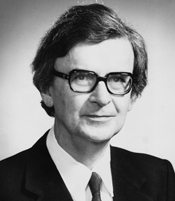Niels K. Jerne, M.D.

Brief Bio
Niels Kaj Jerne was born on December 23, 1911, in London to Danish parents. He grew up in Holland and received his baccalaureate in Rotterdam in 1928. After studying physics at the University of Leiden for two years, Jerne moved to Copenhagen in 1933 to study medicine, but his schooling was interrupted by the Second World War. He began his research in immunology at the Danish State Serum Institute in 1943 and remained there after completing his M.D. at the University of Copenhagen in 1951. He spent 1954 and 1955 in the U.S. as a research fellow in Max Delbrück's laboratory at the California Institute of Technology, where he examined immune responses to bacteriophage T4. He headed the sections of Biological Standards and of Immunology at the World Health Organization in Geneva from 1956 to 1962 before chairing the Department of Microbiology at the University of Pittsburgh from 1962 to 1966. Jerne returned to Europe in 1966 to accept the directorship of the Paul Ehrlich Institute and a professorship in experimental therapy at the Johann Wolfgang Goethe University in Frankfurt. In 1969, Jerne became the founding director of the Basel Institute for Immunology, where he remained until his retirement in 1980. He lived in Paris from 1981 to 1982 and served as special immunology adviser to the director of the Pasteur Institute before retreating to his chateau in Castillon du Gard in southern France.
Jerne died of cancer at his home on October 7, 1994. He was 82.
Nobel Prize in Physiology or Medicine
1984 Nobel Prize in Physiology or Medicine with
Georges J.F. Köhler (AAI '85) and
César Milstein (AAI ’79) “for theories concerning the specificity in development and control of the immune system and the discovery of the principle for production of monoclonal antibodies.”
Click here for more details.
AAI Service History
Joined: 1965
Nobel Prize in Science
Niels K. Jerne, M.D., AAI '65, was awarded the 1984 Nobel Prize in Physiology or Medicine for developing three theories that form the basis of modern cellular immunology. He shared the Nobel jointly with César Milstein (AAI '79) and Georges J.F. Köhler (AAI '85), immunologists honored for developing the hybridoma technique for producing monoclonal antibodies, for his theories concerning "the specificity in development and control of the immune system."
Jerne's three main theories challenged widely held views concerning the development of antibodies and laid new foundations for contemporary immunology. Jerne published his first theory, the "natural-selection theory" of antibody formation, in 1955. At the time, immunologists believed that specific antibodies were nonexistent until their corresponding antigens entered the system and served as templates upon which the antibodies were created. Another leading theory at the time held that antigens introduced into cells were modified by enzymes and that repeated antigen exposure caused replication of antibodies that were partial replicas of these enzyme-modified antigens. Jerne challenged both of these notions, hypothesizing that all antibodies are formed during fetal development and are present in the body from birth. He suggested that when an antigen enters the body, it binds to a pre-existing complementary antibody and stimulates the rapid production of identical antibodies.
With his second theory, first set forth in 1971, Jerne sought to explain how the immune system learns to distinguish self from non-self. Immunologists at the time thought that the body's self-tolerance could not be inherited as a standard pattern but must be learned. Jerne theorized that this "learning" takes place in the thymus gland in the upper chest, where different populations of lymphocytes are exposed to histocompatibility antigens. Lymphocytes that recognize self-antigens are suppressed, whereas non-self lymphocytes, which have accumulated spontaneous mutations, develop and multiply into lymphocytes that can detect foreign antigens.
In 1974, Jerne published his third and most significant theory, his "network theory," which revolutionized the way immunologists thought about adaptive immunity and immune regulation. Jerne posited that an antibody can bind to the antigen-specific variable region of another antibody and elicit production of anti-antibodies, a process, which, in turn, triggers a successive cascade of anti-anti-antibody production. This cascade broadens the diversity of the antibody population, and the network attains a state of balance under normal conditions, which can be perturbed and restored during additional antigen exposures.
Jerne believed that an understanding of how the immune system generates diverse responses was essential to the development of effective treatment of diseases. His network theory provides the theoretical foundation for therapies used to treat infections, allergies, and autoimmune diseases. Insights derived from the network theory have also been used in transplantation to prevent organ rejection, in endocrinology to overcome insulin resistance, and in cancer therapy to create personalized therapies against tumors.
Arthur M. Silverstein (AAI '63) has written that Jerne's contributions to immunology were "almost too numerous to record" and that his "theoretical contributions . . . helped to bring immunology and immunologists to their current important position in the biomedical sciences." Indeed, many immunologists believed that Jerne should have received the Nobel years before he actually did. Jerne, however, rebutted this sentiment. When accepting his Nobel, he declared, "The Nobel Prize is a precious gift, and it is wonderful to receive this gift rather late in life: one does not then have to carry for a very long time the burden that this distinction imposes."
Awards and Honors
- Foreign honorary member, American Academy of Arts and Sciences, 1967
- Member, Royal Danish Academy of Sciences, 1969
- Gairdner Foundation International Award, 1970
- Waterford Biomedical Science Award, 1978
- Marcel Benoist Prize, 1979
- Foreign honorary member, American Philosophical Society, 1979
- Fellow of the Royal Society, 1980
- French Academy of Sciences, 1981
- Paul Ehrlich Prize, 1982
- Nobel Prize in Physiology or Medicine, 1984
Institutional/Biographical Links